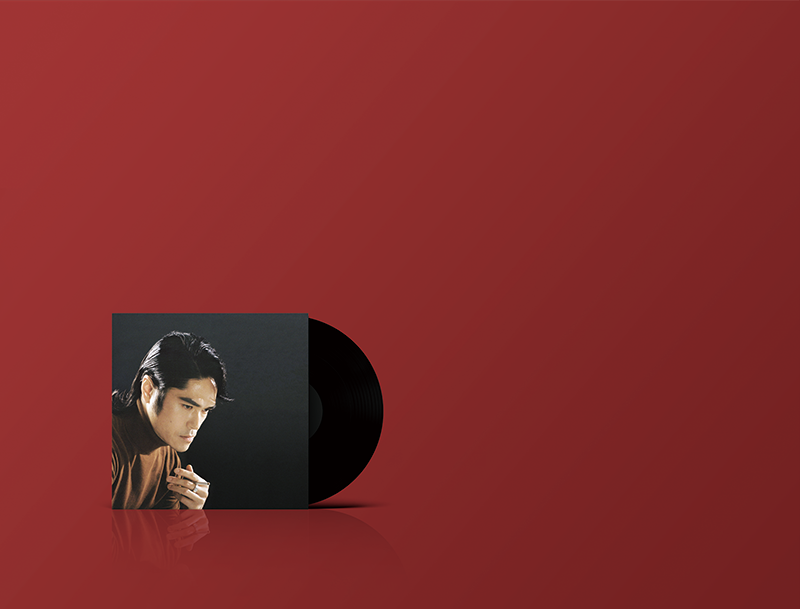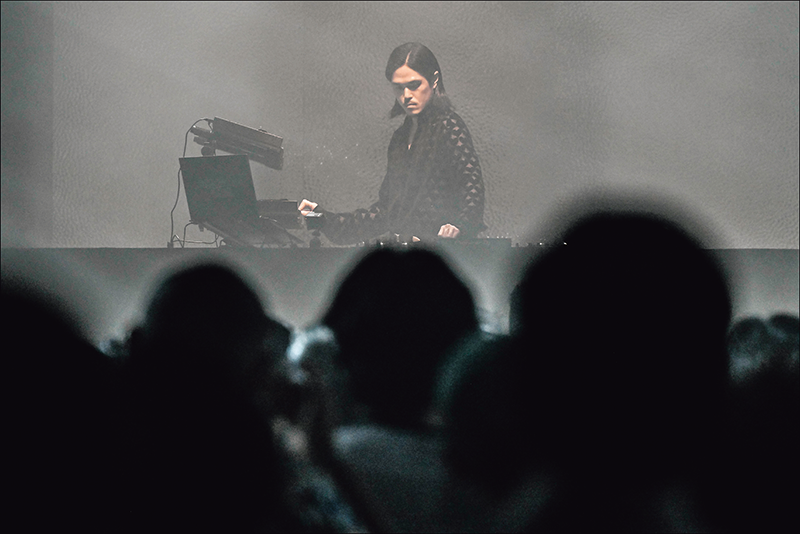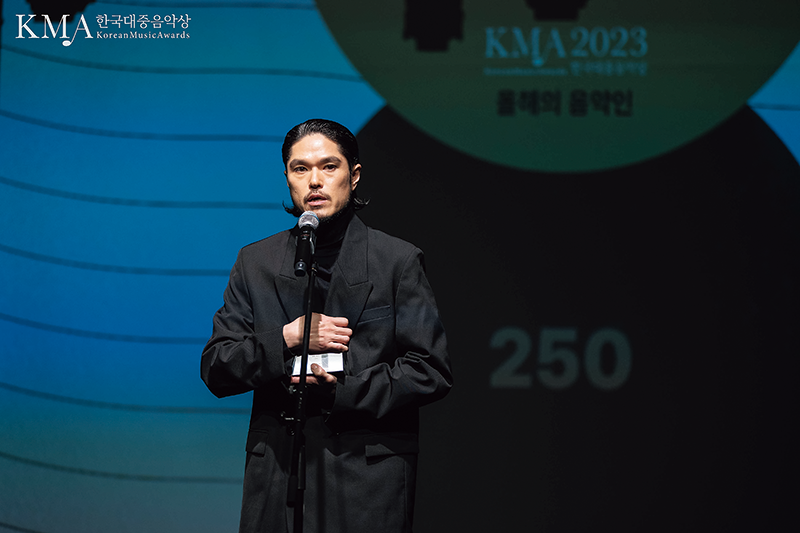The producer, musician, and disc jockey known as 250 has breathed new life into ppongjjak, a subgenre of trot, the sometimes ignored or even ridiculed Korean music genre that has been around for nearly 100 years. His 2022 album Ppong contains his unique musical sensibilities and has garnered attention beyond the Korean music scene. Not only has he created award-winning music of his own, but he has also produced hits for other artists.

The singer, DJ, songwriter, and producer known as 250 is a central figure of Korea’s contemporary pop music scene. He fuses electronic music with ppongjjak, Korea’s soulful pop music from decades ago.
© Beasts And Natives Alike
Imagine it’s your first time making Korean instant ramyeon, or ramen. Simply adding the noodles and vegetable flakes to boiling water won’t do; the dish is only complete once you mix in the contents of the chili powder sachet that create the characteristic spicy broth.
Just as buldak bokkeum myeon (lit. fire chicken stir-fried noodles) is known as the spiciest Korean ramyeon, 250 is widely recognized as the hottest music personality—both on stage and behind the scenes—and any discussion of contemporary Korean pop music must include the 41-year-old music producer, DJ, and electronic musician, whose real name is Lee Ho-hyeong.
250 pioneered modern ppongjjak, a groundbreaking mixture of hip-hop, electronic dance music (EDM), and trot. In March 2023, his genre-bending debut album, Ppong, earned him top honors at the 20th Korean Music Awards (KMA), which prioritize musicianship and artistic achievement over popularity. The judges—music critics and reporters—bestowed 250 with the awards for Musician of the Year, Album of the Year, Best Electronic Album, and Best Electronic Song (“Bang Bus”).
In addition, 250 received recognition as the producer behind K-pop juggernaut NewJeans. Since debuting in mid-2022, the quintet has upended the formula for girl groups, earning the most nominations and winning in three categories at the 2023 KMAs: Rookie of the Year, Best K-Pop Album (“New Jeans”), and Best K-Pop Song (“Attention”). 250 has also worked on hits by K-Pop groups BTS, NCT 127 and ITZY.
INSPIRATION
250 started dabbling in trot ten years ago, after buying a trot tape at a highway rest area on a trip back to Seoul. Initially, he simply wanted to have some fun remixing the music during his DJ gigs, but what started as a whimsical turn of the dials soon transitioned into a serious exploration of blending trot with EDM.
Trot is a shortened form of foxtrot, the ballroom dance style that influenced the rhythm of trot. The lyrics and vocal inflections evoke feelings of sorrow, romance, and joy often experienced by Koreans. Trot is Korea’s oldest style of pop music and instantly recognized by people of all ages. Yet, until recently, it was largely ignored and often dismissed as tacky and lowbrow.
The name ppongjjak is a self-deprecating play on the onomatopoeic term kungjjak, which imitates the sound of Korean drums. Ppong alone conjures bawdy images and is rarely uttered in everyday conversation. It was the title of a popular 1986 adult film and is also slang for drugs. “It’s funny, it’s strange, it’s dark... The single syllable ‘ppong’ embodies all these multifaceted, complex symbols and feelings,” says 250.
I met 250 in Yongsan, a district in central Seoul that was long known as an enclave for expats. These days, its retro vibe mostly attracts young Koreans and foreign tourists. Sitting in his studio, looking at me with his trademark serious expression, 250 recalls his “Eureka!” moment when he was experimenting with formats that could work with trot. It struck while watching Rear Window, a 1954 suspense thriller directed by Alfred Hitchcock about a wheelchair-bound man who spends his time observing his neighbors across the courtyard.
After watching it, 250 wrote a song and named it after the film. “It felt like ppong and non-ppong music were staring at each other across a transparent window,” 250 explains. That metaphysical window is key to understanding 250’s musical world.
MUSIC PATH
250 majored in film music production at Hanseo University. In his early years, he composed music for TV soap operas and worked as DJ at Cakeshop, a renowned nightclub and hub for electronic music in Seoul’s Itaewon neighborhood. It was at that time that 250 bought the trot tape that changed his musical direction.
As clubbers spread the word about a DJ who played eccentric music, 250 began to attract greater attention. Before long, he was commissioned by SM Entertainment to remix the original music of major K-pop groups. He also produced “Everywhere” and “Flight” for popular rapper E SENS.
In 2018, 250 launched a low-budget documentary series called
In Search of Ppong. The response from the music industry was light-hearted, essentially saying, “OK, so he’s as good at comedy as he is at creating beats.”
The singles “Rear Window” and “Bang Bus” created a little buzz in 2018 and 2021, respectively, and finally in March 2022, when his debut album
Ppong was released, fans and critics responded enthusiastically to his inventive music. The album had been years in the making, during which 250 almost exclusively listened to trot and sought out famous trot entertainers to record the sounds that echoed the war, division, despair, and nostalgia of 20th century Korea.
REVOLVING DEFINITION
250 considers ppongjjak to be the background music of the Korean cultural sphere, comparing its status to that of hip-hop in New York City or favela funk in Rio de Janeiro. “Hip-hop songs that use rudimentary equipment to play samples of music recorded long ago by great musicians or a 50-piece orchestra have a unique charm to them. The same goes for ppongjjak,” says 250.
While exploring ppongjjak, he also realized that it is related to Korean food culture. “Koreans tend to enjoy spicy dishes like kimchi stew or
jeongol (hot pot). They only feel satisfied when their food is hot and spicy. I recently traveled to Belgium for about a week, and as soon as I returned, my manager and I went to a local kimchi stew joint. Just like something spicy and exciting resonates more with Koreans than something bland, the dynamics of ppongjjak seems to appeal to them. I find the music very attractive as it combines decidedly sad sounds with something lively in an artless way.”
250’s definition of ppong has continued to evolve. “Ppongjjak is like the ramyeon soup powder that every Korean knows. When you’re making kimchi stew and feel something is missing, you add a little bit of the powder, right? It may not be particularly sophisticated but it brings out the familiar and satisfying taste that lingers in your mouth. It is the last piece of the puzzle that all Koreans look for when something is amiss.”
RETRO TREND
250’s popularity has paralleled the retro trend in Korea, which includes music, clothing, and gadgets from the past. Trot music in general has enjoyed a revival in recent years.
What seems familiar yet unfamiliar, out of style yet hip and mysterious in 250’s world of ppong is most passionately embraced by fans in their teens and 20s. Surprisingly, they are the generation farthest from the 20th century when trot was closely intertwined with the daily lives of Koreans.
“They live in an era where everything is well organized and neatly trimmed. So, instead of the even staircases in the city center, they enthusiastically point their film cameras at the uneven staircases of old buildings on the outskirts of Seoul. Recently, country music has become increasingly popular on the Billboard charts. This phenomenon could be similar to the popularity of trot on the Korean music charts in recent years.”
Aside from his music interests, 250 is also a fan of other “old school” things. He confessed to being fascinated by the logic-defying action scenes in Hong Kong films from the 1970s and 1980s, like those in Jackie Chan’s early works such as
The Fearless Hyena (1979).
“Someday, I want to try my hand at creating film music. I am particularly keen on films where you have to concentrate intensely on sound like
A Quiet Place (2018), large-scale films like
Inception (2010), and films that are famous for their signature scores, like the ones that the late composer and music director Ennio Morricone was involved in.”
His documentary,
In Search of Ppong, was shown on a big screen for the first time at the 2023 Bucheon International Fantastic Film Festival.
“I don’t have a specific role model, but I want to try everything musically, like music producer Quincy Jones or composer and musician Ryuichi Sakamoto, who died earlier this year.”
250 plans to call his next work
America. “Now that I have explored Korean music with ppongjjak, I think it’s time for me to explore American music. It could be an album filled with fantasies about the America I admired and the American music I enjoyed during my school days.” Whatever he will be cooking up next, 250 will continue to add his unique ingredients.

250 is a play on the artist’s real name, Lee Ho-hyeong, which sounds like pronouncing the numbers 2, 5, 0 (ee-oh-yeong) in Korean. But contrary to his expectation, most people use the alternate pronunciation for zero and pronounce 250 as “ee-oh-gong.”
© SEJONG CENTER FOR THE PERFORMING ARTS

250’s debut album Ppong earned him four accolades at the 20th Korean Music Awards. He feels the honor is all the more meaningful because winning in the Best Electronic Song and Best Electronic Album categories acknowledged that Ppong was electronic music.
© Beasts And Natives Alike
Lim Hee-yun Music Critic